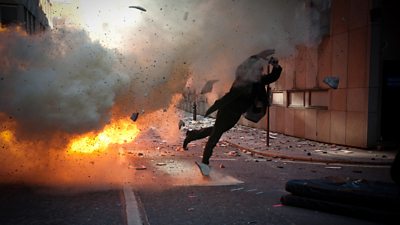The hazards these create have to be managed to create a entertaining spectacle for the viewer/audience, but also a safe one for those taking part or nearby. They may also need to be synchronised with action sequences co-ordinated by others, such as stunts, presentation or contributor participation in gameshows.
What Can Go Wrong?
General Hazards
- Fire, radiated heat, explosion, flashes and blast effects.
- Excessively loud noise and pressure waves that might cause damage or shock to people, stages, sets and nearby structures.
- Uncontrolled projectiles, shrapnel and flying debris: misfires or failed effects can create extra hazards.
- Moving objects, vehicles, sets and other structures can cause unplanned collisions and impacts.
- Smoke, chemical haze or mists, dust, water or chemical release that might also lead to shock, disorientation or toxic effects.
- Electrical flashover and shock risks to people and equipment.
- Trauma, stress, mental shock, injuries and physical effects to actors and observers.
- A dynamic working environment with little or no rehearsal on live music events with Stage pyro and smoke effects (see also Laser Lighting effects).
Contributing Factors
- Appointment of an unsuitable SFX supervisor.
- The late appointment of an SFX supervisor.
- Poor communication and sharing of information between the production, SFX supervisor and other third party contractors.
- The effect of hazards can be greater in enclosed spaces and may also induce panic if observers or those nearby are not expecting the hazard to occur.
- Not having management control of a live music event that you are covering where SFX contractors are provided by the event organiser or band.
Legal/Βι¶ΉΤΌΕΔ Requirements
- The law requires you to appoint a competent person/contractor to conduct work on your behalf.
- The Βι¶ΉΤΌΕΔ vetted list and the BECTU Joint industry grading list is your benchmark for competency.
Control Measures
General Controls
- Appoint a supervisor from the Βι¶ΉΤΌΕΔ pre-vetted contractor list or from the BECTU Joint Industry Grading Scheme (JIGS).
- Appoint the Supervisor at the earliest opportunity.
- Be clear about your ambition for the sequence and what your budget is.
- Ensure that you receive a specific risk assessment and method statement from the supervisor in plenty of time.
- Read the risk assessment and method statement carefully and question anything you don’t understand. It will probably make requests that you have to action, like provide a emergency arrangements & first aid facilities on site.
- Ensure that the contents of the risk assessment are shared with your key production members and any third party contractors involved. Key points to look out for in the information provided by your supervisor will detail transport, storage, equipment used, exclusion areas, misfires, fire safety.
- The SFX supervisor should identify environmental risks on the risk assessment, and ensure appropriate control measures are in place.
- For example: storing potentially-polluting chemicals and oils in suitable containers with drip-trays/bunds, providing spill kits where necessary;
- Other examples: disposing of contaminated waste water in accordance with relevant Material Safety Data Sheets; appropriate disposal of any waste materials.
- On live music events it is important you agree with the SFX supervisor and your crew the exclusion zones around stage pyro’s. The cue’s to move to the agreed position should be given in plenty of time before the firing of major SFX effects. The SFX supervisor should have line of sight of the effects from the stage and they should have enough crew members in the pit to assist them in maintaining the exclusion zones at the right times. Talkback is of limited use in this environment and cannot be relied on to be the primary source of instruction to your front of house crew.
- You should ask the event manager to provide the SFX risk assessment prior to the event
- You should walk through the stage SFX set up with the supervisor and your crew ensuring that the supervisor describes clearly the effect i.e. Co2, confetti cannons etc.
International Working
- If planning to carry out special effects outside the UK, or where a vetted contractor is not available you should consult with Βι¶ΉΤΌΕΔ Safety for advice at the earliest opportunity.
Division Specific Issues
- No division specific issues.
FAQs/Did You Know?
Must I use a supervisor for all special effects?
- The BECTU Joint Industry Grading Scheme (JIGS) has trainee, technician, senior technician and supervisor grades for physical and pyrotechnic competencies. It takes 15 years to achieve a full supervisor grading. Some simple off the shelf pyro’s can be safely operated by a senior technician. They are usually employed by a supervisor though.
Can I provide simple smoke/haze effects without the use of an SFX supervisor?
- Off the shelf smoke machines and hazers can be operated without the use of an SFX supervisor as long as you have an experienced crew member who has specific training on that machine and you have decided through your risk assessment that the risk is acceptable. Training by the association of stage pyrotechnics or the Βι¶ΉΤΌΕΔ smoke effects course are your benchmark for competency.
Recommended links
- [via Safety Advice Line]
Stunt topics
 Adventure Activities & High Risk SportsSetting up and managing activities for talent and contributors.
Adventure Activities & High Risk SportsSetting up and managing activities for talent and contributors.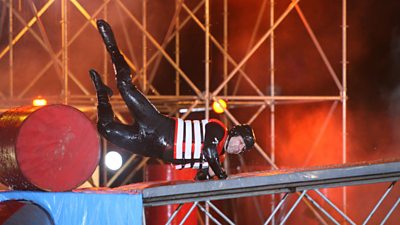 Contributor Fitness to ParticipateA guide to the health of contributors performing physically demanding tasks.
Contributor Fitness to ParticipateA guide to the health of contributors performing physically demanding tasks.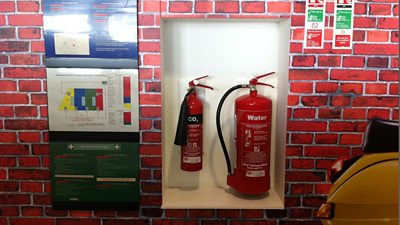 Fire Prevention PrinciplesA general guide to fire precaution measures.
Fire Prevention PrinciplesA general guide to fire precaution measures. Firearms and WeaponsA guide to firearms and weapons used in production, and visiting sites where firearms or weapons are used under strictly controlled conditions.
Firearms and WeaponsA guide to firearms and weapons used in production, and visiting sites where firearms or weapons are used under strictly controlled conditions.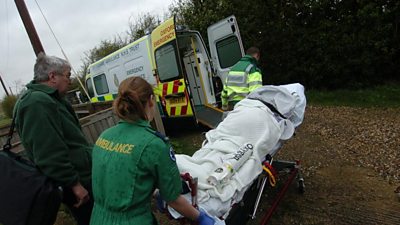 First Aid and Welfare on LocationProvision of first aid on location shoots.
First Aid and Welfare on LocationProvision of first aid on location shoots. Special and Physical EffectsGuideline on how to arrange pyrotechnics, explosives, fire, smoke, rain or other effects for artistic purposes on productions.
Special and Physical EffectsGuideline on how to arrange pyrotechnics, explosives, fire, smoke, rain or other effects for artistic purposes on productions.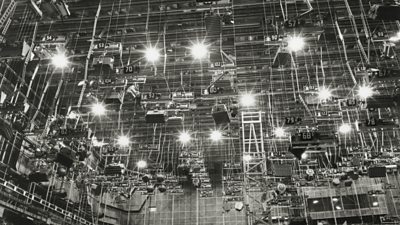 Riggers: Selection ofCompetence criteria for riggers.
Riggers: Selection ofCompetence criteria for riggers.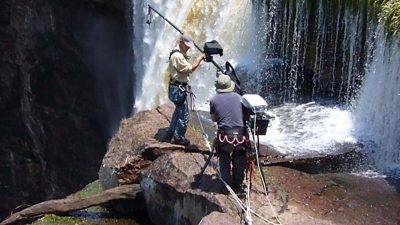 Working at Height: Rope Access TechniquesHow to protect people working in exposed positions.
Working at Height: Rope Access TechniquesHow to protect people working in exposed positions.
Safety tools, guides and contacts
- The new online tool for Risk Assessments, incidents and monitoring (NOTE: Use Google Chrome for Windows or Safari for MAC to fully access)
- Safety Equipment StoresJust one number to call: 0844 800 8875
- Βι¶ΉΤΌΕΔ Safety GuidelinesAccess our A-Z of safety guidelines
- Safety Advice Line: 0370 411 0464 Email: safety@bbc.co.uk
Events guidance - key links:
- Exhibitions
- General Guidance
- Indoor Location Recce Checklist
- Outdoor Location Recce Checklist
- Major Incidents & Emergency Planning
- Marketing and Promotional
- Noise Exposure
- Planning and Management
- Responsibilities
- Responsibilities Form
- Laser Lighting Effects
- Strobe Lighting
- Temporary Stages and Rostra
Health topics - key links:
- (Βι¶ΉΤΌΕΔ network only)
- Contributors Fitness to Participate
- Display Screen Equipment (DSE)
- (Βι¶ΉΤΌΕΔ network only)
- First Aid and Welfare on Location
- International Travel - Risks & Health
- Manual Handling
- Mental Health: Βι¶ΉΤΌΕΔpage
- (Βι¶ΉΤΌΕΔ network only)
- Personal Health and Wellbeing
- Pregnancy
- Psychological Trauma Support & Trauma Risk Management (TRiM)
- Tiredness and Fatigue
- Travel Health Contacts
Βι¶ΉΤΌΕΔ High Risk - key links:
- CBRN and Industrial Spills
- Covert Filming
- Crisis Management and Security Support
- Demonstrations, Protests and Crowds
- Disaster Coverage
- Door Stepping
- (Βι¶ΉΤΌΕΔ network only)
- (Βι¶ΉΤΌΕΔ network only)
- Public Order
- Safety Equipment Stores
Βι¶ΉΤΌΕΔ Journalism - key links:
Βι¶ΉΤΌΕΔ Productions - key links:
- Aerial Filming and Airfields
- Animals: Displaying and handling for performance
- Boats: Working on
- Children and Young People
- Driving
- Electrical Equipment and Systems
- First Aid and Welfare on Location
- Food Safety (Cooking and Catering)
- Remote Location Working
- Roads and Streets: Working by
- Security of Productions on Location
- Stunts
- Tiredness and Fatigue
- Unmanned Aerial Systems (UAS aka Drones)
- Vehicles: Recording in, from and around
- Working at Height: Mobile Elevating Work Platforms
- Working at Height: Tower Scaffolds
- (Βι¶ΉΤΌΕΔ Network only)
Βι¶ΉΤΌΕΔ Security - key links:
Βι¶ΉΤΌΕΔ Sport - key links:
About this site
This site describes what the Βι¶ΉΤΌΕΔ does in relation to managing its health, safety and security risks and is intended for those who work directly for the Βι¶ΉΤΌΕΔ.
It is not intended to provide instruction or guidance on how third parties should manage their risks. The Βι¶ΉΤΌΕΔ cannot be held liable for how this information is interpreted or used by third parties, nor provide any assurance that adopting it would provide any measure of legal compliance. More information
Some links on this site are only accessible when connected to the Βι¶ΉΤΌΕΔ network

